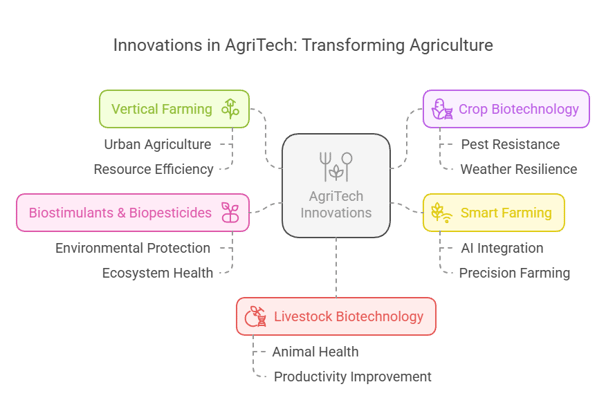Food Security & Agritech Innovations
Revolutionizing agriculture with AI, biotech, and sustainable practices.


The Growing Importance of AgriTech in Shaping the Future of Global Agriculture
The AgriTech sector has undergone significant transformation over the past decade, experiencing rapid innovation and considerable investment. In 2021 alone, global investments in AgriTech reached an impressive $10.5 billion, reflecting strong investor confidence in the potential of technology-driven farming. However, recent years have seen a tempering of venture capital enthusiasm, likely influenced by broader economic uncertainties and shifting investment priorities.
Despite this slowdown, AgriTech remains a critical sector at the intersection of some of the world’s most pressing challenges: climate change, geopolitical tensions, and the increasing demand for food due to population growth. As traditional agricultural practices face mounting pressure to produce more with fewer resources, AgriTech offers innovative solutions that are not only efficient but also sustainable. Industry forecasts predict that the global AgriTech market will surpass $75.87 billion by 2032, growing at a compound annual growth rate (CAGR) of 13.1%. This trajectory underscores the sector’s continued relevance and transformative potential.
Key Innovations Shaping the Future of AgriTech:
Vertical Farming: By growing crops in stacked layers and controlled environments, vertical farming can produce up to 240 times more yield per square foot than conventional methods while using 98% less water. It offers a promising solution for urban agriculture and regions with limited arable land.
Crop Biotechnology: Advances in genetic engineering and selective breeding are helping to create crops that are more resilient to pests, diseases, and extreme weather conditions, while also increasing yields and reducing the need for chemical inputs.
Smart Farming: The integration of artificial intelligence, automation, sensors, and drones is revolutionizing farm management. These technologies allow farmers to monitor soil health, track crop growth, and optimize resource use, leading to greater precision and reduced waste.
Biostimulants & Biopesticides: As concerns over chemical-intensive farming grow, biostimulants and biopesticides offer environmentally friendly alternatives. These biologically derived inputs enhance plant growth and protect against pests without harming ecosystems.
Livestock Biotechnology: Genetic innovations are also advancing animal agriculture, improving livestock health, productivity, and disease resistance, while reducing environmental impact and improving food safety.
AgriTech is poised to redefine how the world grows food. Through improved efficiency, reduced environmental impact, and strengthened food security, the sector is central to building a resilient and sustainable agricultural future. Realizing its full potential will require continued investment, progressive policy frameworks, and broad adoption of cutting-edge technologies. With these elements in place, AgriTech will be a driving force behind the transformation of global food systems.


Get in touch


Get in touch
83 Watsonbrook Dr. Brampton, L6R 0R5, ON, Canada
contact@aidoctrine.com
Shahed Tower, 10 Floor, Mirgab, Kuwait city, Kuwait
